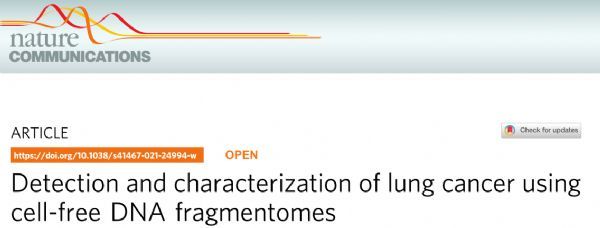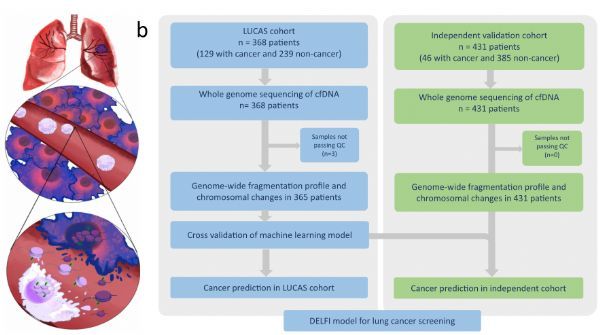Detection and Identification of Lung Cancer by Free DNA Fragment Group
- Normal Liver Cells Found to Promote Cancer Metastasis to the Liver
- Nearly 80% Complete Remission: Breakthrough in ADC Anti-Tumor Treatment
- Vaccination Against Common Diseases May Prevent Dementia!
- New Alzheimer’s Disease (AD) Diagnosis and Staging Criteria
- Breakthrough in Alzheimer’s Disease: New Nasal Spray Halts Cognitive Decline by Targeting Toxic Protein
- Can the Tap Water at the Paris Olympics be Drunk Directly?
Detection and Identification of Lung Cancer by Free DNA Fragment Group
- Should China be held legally responsible for the US’s $18 trillion COVID losses?
- CT Radiation Exposure Linked to Blood Cancer in Children and Adolescents
- FDA has mandated a top-level black box warning for all marketed CAR-T therapies
- Can people with high blood pressure eat peanuts?
- What is the difference between dopamine and dobutamine?
- How long can the patient live after heart stent surgery?
Nature Sub-Journal: Detection and Identification of Lung Cancer by Free DNA Fragment Group.
Lung cancer is the deadliest cancer in the world. The 5-year survival rate is lower than 20% mainly due to the late diagnosis, the treatment effect is not as good as the early stage, and the incidence of lung cancer continues to rise.
Non-invasive cell-free DNA (CfDNA) detection methods provide opportunities for cancer detection and intervention. Here, the author uses a machine learning model to detect tumor-derived cfDNA through genome-wide analysis of cfDNA fragmentation.
This is a prospective study of 365 high-risk individuals with lung cancer. The authors used an independent cohort of 385 non-cancer patients and 46 lung cancer patients to validate the cancer detection model. This method provides a convenient way for non-invasive detection of lung cancer.

Image source: https://doi.org/10.1038/s41467-021-24994-w
Lung cancer is the deadliest cancer in the world. The 5-year survival rate is lower than 20% mainly due to the late diagnosis, the treatment effect is not as good as the early stage, and the incidence of lung cancer continues to rise.
Although large randomized trials have shown that lung cancer screening using low-dose computed tomography (Ldct) of the chest can reduce the mortality of high-risk individuals, due to concerns about the potential harm of false-positive imaging results, radiation exposure, and the incidence of invasive diagnostic procedures, ldct is still underutilized, and less than 6% of high-risk individuals are screened.
There is an urgent clinical need to develop non-invasive methods to improve cancer screening for high-risk individuals and ultimately the general population. The biomarkers developed for early detection of lung cancer have a wide range of clinical applications in chest imaging screening and distinguishing lung cancer from non-cancerous lung nodules.
Studies of proteins, autoantibodies, gene expression profiles and microRNAs in the blood or airway epithelium have found biomarkers that are promising for early detection of lung cancer, although some of them may be related to age, inflammation caused by smoking, or other comorbid conditions (Such as autoimmune diseases), and none of them are approved for clinical use.
The rapid advancement of liquid biopsy technology and analysis has found cancer-related features in cfDNA fragments in peripheral blood, and has provided a new way for non-invasive detection of cancer. The authors and others have previously demonstrated that mutations or methylation in circulating tumor DNA (Ctdna) can be directly detected in patients with early-stage lung cancer without prior knowledge of these changes in the tumor.

Schematic diagram of the overall method
Image source: https://doi.org/10.1038/s41467-021-24994-w
In order to improve the sensitivity of early cancer detection, the authors developed a method for genome-wide analysis of cfdna fragment maps, called delfi (early intercepted DNA fragment assessment). This method provides a view of the cfDNA “fragment group”, allowing the size, distribution, and frequency of the millions of naturally occurring cfDNA fragments in the genome to be assessed in any individual. Because the cfDNA fragment group can fully represent the genome and chromatin characteristics, it is possible to identify a large number of tumor-derived changes in the circulation.
In this study, the authors used this method to detect and characterize lung cancer in a prospectively collected real-world cohort that included patients with malignant and benign lung nodules as well as non-cancer patients, including those with other clinical symptoms.
Through this effort, the authors provide a framework to combine cfDNA fragmentation profiles with other markers and LDCT for lung cancer detection, thereby applying non-invasive liquid biopsy to the clinic
(source:internet, reference only)
Disclaimer of medicaltrend.org
Important Note: The information provided is for informational purposes only and should not be considered as medical advice.



